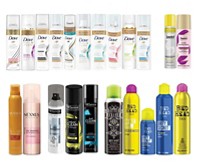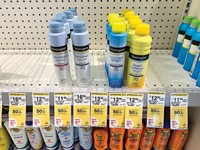Advertisement
Grab your lab coat. Let's get started
Welcome!
Welcome!
Create an account below to get 6 C&EN articles per month, receive newsletters and more - all free.
It seems this is your first time logging in online. Please enter the following information to continue.
As an ACS member you automatically get access to this site. All we need is few more details to create your reading experience.
Not you? Sign in with a different account.
Not you? Sign in with a different account.
ERROR 1
ERROR 1
ERROR 2
ERROR 2
ERROR 2
ERROR 2
ERROR 2
Password and Confirm password must match.
If you have an ACS member number, please enter it here so we can link this account to your membership. (optional)
ERROR 2
ACS values your privacy. By submitting your information, you are gaining access to C&EN and subscribing to our weekly newsletter. We use the information you provide to make your reading experience better, and we will never sell your data to third party members.
Consumer Products
Unwanted reaction causes benzene to form in acne medication, lab finds
Valisure has petitioned the US FDA to pull all products using benzoyl peroxide
by Craig Bettenhausen
March 11, 2024

Concerns about benzene in personal care products are back, this time in acne medications based on benzoyl peroxide. Benzene is known to cause cancer in humans.
The independent analytical lab Valisure filed a petition last week asking the US Food and Drug Administration to recall and suspend sales of all benzoyl peroxide products. David Light, the firm’s cofounder and president, says his team found that the ingredient decomposes to benzene in consumer product formulas.
Valisure has found benzene in multiple consumer products in recent years, including hand sanitizer, sunscreen, dry shampoo, and aerosol antifungal medication. But in those cases, the benzene seems to have been a contaminant in the raw materials, and the findings were limited to certain batches and brands.
In acne products, Light says, the primary active ingredient breaks down into benzene under conditions that products might encounter in transport and in the home. The firm also found that the benzene diffused out of many of the bottles over time. “The evidence strongly shows us that this is a broad benzoyl peroxide problem,” he says. “We don’t have confidence on any product being immune at this point.”

Consumer product makers insist their acne medications are safe. Estée Lauder, which uses benzoyl peroxide in one Clinique-brand product, says it is “an FDA-approved and commonly used ingredient for acne treatment. . . . This product, like all of our products, is safe for use as intended.”
The industry’s criticism emphasizes storage conditions. Much of Valisure’s data documents the emergence of benzene over time in products held at 50 °C and 70 °C—temperatures that consumers are told to avoid. The label on the acne product Clearasil, for example, instructs consumers to store the product at room temperature away from bright light. And some prescription-strength benzoyl peroxide formulas are meant to be stored in the fridge.
Reckitt, which makes Clearasil, says it “is confident that all Clearasil products, when used and stored as directed on their labels, are safe.” The firm also questions Valisure’s testing protocols. “The findings presented by an independent lab today reflect unrealistic scenarios rather than real-world conditions.”
A statement from the Personal Care Products Council, an industry group, is even more critical. “The findings in the most recent Valisure petition are based on unproven, questionable methods applying unrealistic conditions which are inconsistent with the way the product would be stored normally,” it says.
Light counters that testing at elevated temperature is a standard, FDA-suggested method for simulating how a substance will behave over long periods of time. “It’s not meant to copy the exact conditions of what a person is going to use every day; it’s meant to understand the full life cycle and ensure the safety of that full life cycle of the product,” he says. “Any manufacturer, I assume, knows that.”
In a statement, the FDA says it is reviewing the petition and will respond when it has validated Valisure’s data. The statement reminds manufacturers that they are responsible for safety and stability testing for both prescription and over-the-counter drugs. “Drug manufacturers are required to ensure the safety and quality of their drugs,” the FDA says.
In March 2023, Light and two Valisure colleagues filed a wide-ranging patent on chemical methods to suppress the conversion of benzoyl peroxide into benzene in formulation. The patent is assigned to Blue Hill Technologies, a subsidiary of Valisure. Light says plans to commercialize the patent are immature, but benzoyl peroxide could be part of a new avenue for his company “to not only identify these issues, but to help solve them.”




Join the conversation
Contact the reporter
Submit a Letter to the Editor for publication
Engage with us on Twitter